Unit 8 Culture Shapes Us Lesson 45 Different Manners 课件(共20张PPT)
文档属性
| 名称 | Unit 8 Culture Shapes Us Lesson 45 Different Manners 课件(共20张PPT) |

|
|
| 格式 | zip | ||
| 文件大小 | 4.5MB | ||
| 资源类型 | 教案 | ||
| 版本资源 | 冀教版 | ||
| 科目 | 英语 | ||
| 更新时间 | 2020-05-25 18:35:40 | ||
图片预览

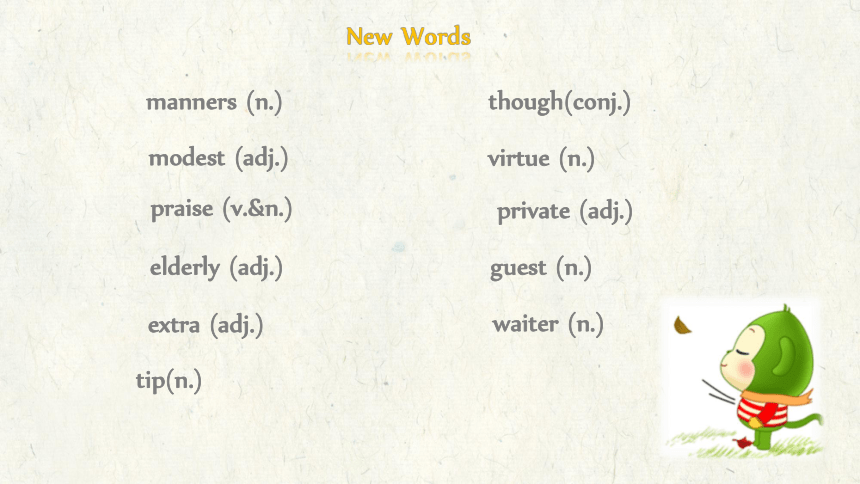
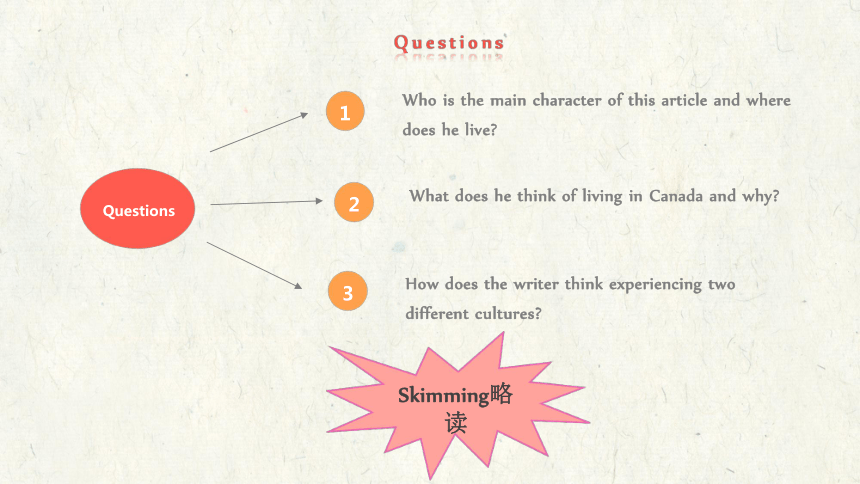
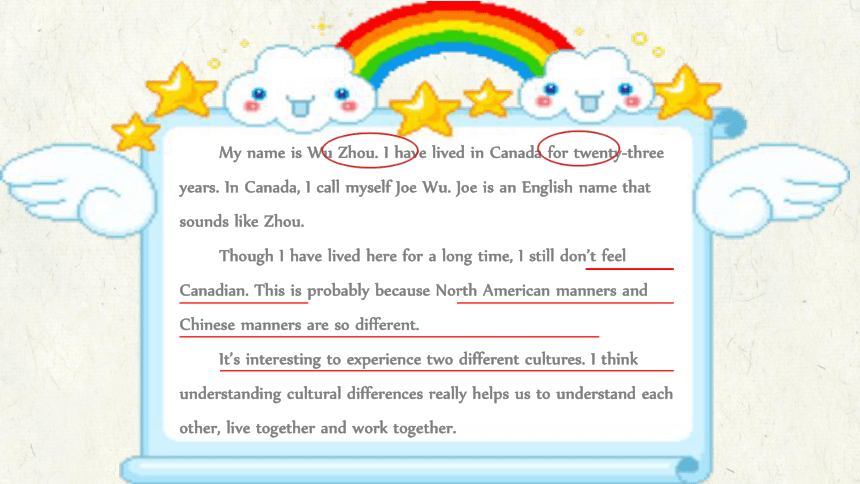
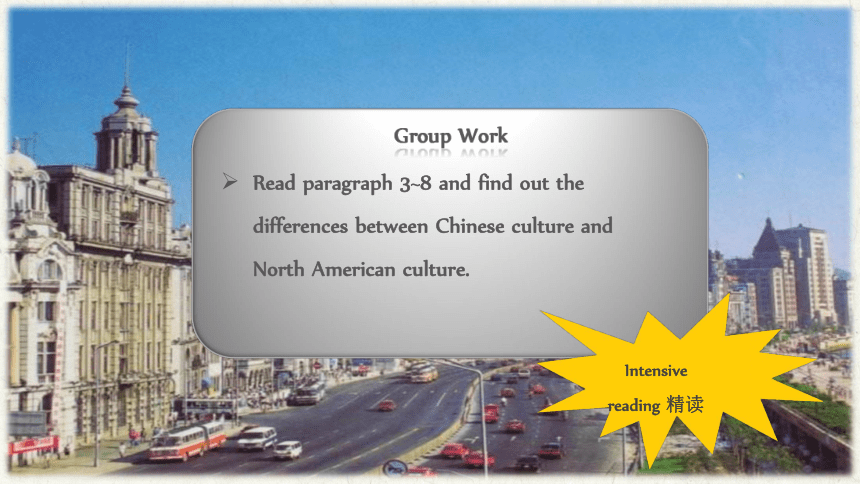
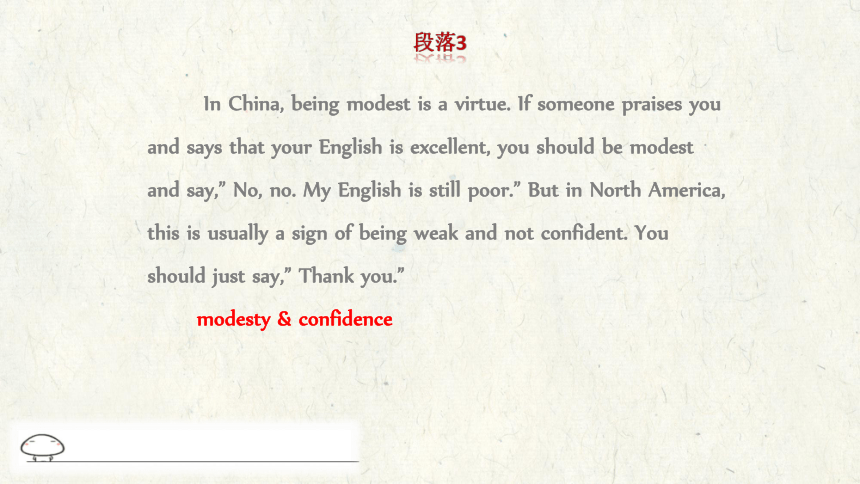


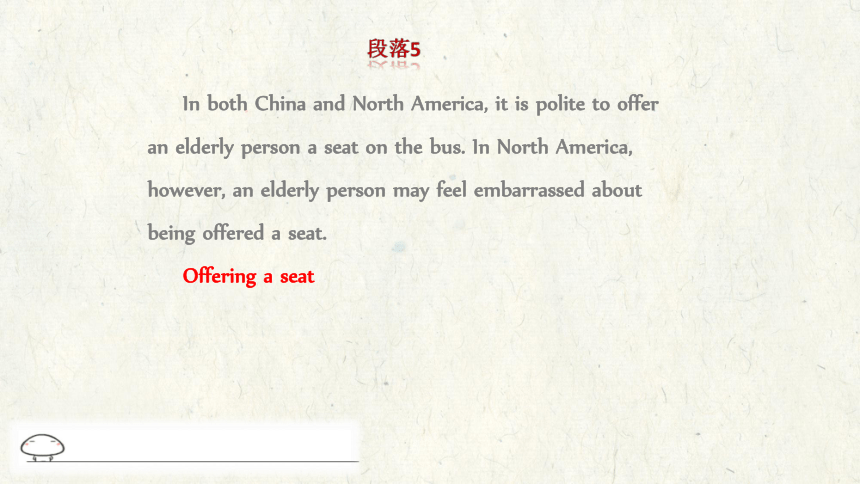
文档简介
(共20张PPT)
Lesson 45
Different Manners
冀教版九年级英语全一册 Unit8
manners (n.)
New Words
modest (adj.)
praise (v.&n.)
virtue (n.)
though(conj.)
elderly (adj.)
private (adj.)
waiter (n.)
extra (adj.)
guest (n.)
tip(n.)
Who is the main character of this article and where does he live?
Questions
1
Questions
What does he think of living in Canada and why?
2
3
How does the writer think experiencing two different cultures?
Skimming略读
My name is Wu Zhou. I have lived in Canada for twenty-three years. In Canada, I call myself Joe Wu. Joe is an English name that sounds like Zhou.
Though I have lived here for a long time, I still don’t feel Canadian. This is probably because North American manners and Chinese manners are so different.
It’s interesting to experience two different cultures. I think understanding cultural differences really helps us to understand each other, live together and work together.
Read paragraph 3~8 and find out the differences between Chinese culture and North American culture.
Group Work
Intensive reading 精读
In China, being modest is a virtue. If someone praises you and says that your English is excellent, you should be modest and say,” No, no. My English is still poor.” But in North America, this is usually a sign of being weak and not confident. You should just say,” Thank you.”
modesty & confidence
段落3
In Canada, people only ask children about their age. It’s not polite to ask an adult’s age. They think it is private. But this is common in many places in China.
privacy
段落4
1.It is + adj. + to do sth.做某事是….的
学习英语是重要的。
It is + adj. + for sb. + to do sth.做某事对某人来说是…的 。
e.g. It is important to learn English.
It is + adj. + of sb. + to do sth.某人做某事是…的。
你帮我你真好。
e.g. It is very kind of you to help me.
e.g. It is necessary for us to drink much water every day.
每天喝大量的水对我们来说是有必要的。
In both China and North America, it is polite to offer an elderly person a seat on the bus. In North America, however, an elderly person may feel embarrassed about being offered a seat.
Offering a seat
段落5
When Chinese people eat out in restaurants, they may take turns paying for the meal. In Canada, however, people often share the cost of a meal.
Paying for the meal
段落6
2.Take turns doing sth.轮流做某事。
We take turns cleaning the classroom.
我们轮流打扫教室。
They took turns taking photos yesterday.
他们昨天轮流拍照。
In China, if your guests have no food on their plates, it’s polite to put food on their plates. In Canada, you pass food to guests, but you don’t usually put food on their plates.
table manners
段落7
In China, people seldom give extra money to waiters, waitress, taxi drivers or hotel workers. In North America, this is always done. It is called “tipping”.
tip
段落8
What cultural differences, besides the ones already discussed, have you noticed between China and English-speaking countries? Share your ideas with your classmates.
Think about it
What have you learned in this class?
Reading skills
Cultural differences
Summary
Language points
Review the lesson.
Write down your ideas about cultural
difference. (around 60 words)
Homework
When in Rome, do as the Romans do!
入乡随俗!
Have a nice day!
Thanks for listening!
Lesson 45
Different Manners
冀教版九年级英语全一册 Unit8
manners (n.)
New Words
modest (adj.)
praise (v.&n.)
virtue (n.)
though(conj.)
elderly (adj.)
private (adj.)
waiter (n.)
extra (adj.)
guest (n.)
tip(n.)
Who is the main character of this article and where does he live?
Questions
1
Questions
What does he think of living in Canada and why?
2
3
How does the writer think experiencing two different cultures?
Skimming略读
My name is Wu Zhou. I have lived in Canada for twenty-three years. In Canada, I call myself Joe Wu. Joe is an English name that sounds like Zhou.
Though I have lived here for a long time, I still don’t feel Canadian. This is probably because North American manners and Chinese manners are so different.
It’s interesting to experience two different cultures. I think understanding cultural differences really helps us to understand each other, live together and work together.
Read paragraph 3~8 and find out the differences between Chinese culture and North American culture.
Group Work
Intensive reading 精读
In China, being modest is a virtue. If someone praises you and says that your English is excellent, you should be modest and say,” No, no. My English is still poor.” But in North America, this is usually a sign of being weak and not confident. You should just say,” Thank you.”
modesty & confidence
段落3
In Canada, people only ask children about their age. It’s not polite to ask an adult’s age. They think it is private. But this is common in many places in China.
privacy
段落4
1.It is + adj. + to do sth.做某事是….的
学习英语是重要的。
It is + adj. + for sb. + to do sth.做某事对某人来说是…的 。
e.g. It is important to learn English.
It is + adj. + of sb. + to do sth.某人做某事是…的。
你帮我你真好。
e.g. It is very kind of you to help me.
e.g. It is necessary for us to drink much water every day.
每天喝大量的水对我们来说是有必要的。
In both China and North America, it is polite to offer an elderly person a seat on the bus. In North America, however, an elderly person may feel embarrassed about being offered a seat.
Offering a seat
段落5
When Chinese people eat out in restaurants, they may take turns paying for the meal. In Canada, however, people often share the cost of a meal.
Paying for the meal
段落6
2.Take turns doing sth.轮流做某事。
We take turns cleaning the classroom.
我们轮流打扫教室。
They took turns taking photos yesterday.
他们昨天轮流拍照。
In China, if your guests have no food on their plates, it’s polite to put food on their plates. In Canada, you pass food to guests, but you don’t usually put food on their plates.
table manners
段落7
In China, people seldom give extra money to waiters, waitress, taxi drivers or hotel workers. In North America, this is always done. It is called “tipping”.
tip
段落8
What cultural differences, besides the ones already discussed, have you noticed between China and English-speaking countries? Share your ideas with your classmates.
Think about it
What have you learned in this class?
Reading skills
Cultural differences
Summary
Language points
Review the lesson.
Write down your ideas about cultural
difference. (around 60 words)
Homework
When in Rome, do as the Romans do!
入乡随俗!
Have a nice day!
Thanks for listening!
同课章节目录
- Unit 7 Work for Peace
- Lesson 37 Don't Fight!
- Lesson 38 Making School a Better Place
- Lesson 39 The Dove and the Olive Branch
- Lesson 40 The UN—Power of Words
- Lesson 41 Jenny's Good Advice
- Lesson 42 Peace at Last
- Unit Review
- Unit 8 Culture Shapes Us
- Lesson 43 A Visit to Chinatown
- Lesson 44 Popular Sayings
- Lesson 45 Different Manners
- Lesson 46 Home to Many Cultures
- Lesson 47 Good Manners
- Lesson 48 Supper with the Bradshaws
- Unit Review
- Unit 9 Communication
- Lesson 49 Get Along with Others
- Lesson 50 Tips for Good Communication
- Lesson 51 What Could Be Wrong?
- Lesson 52 The Power of a Smile
- Lesson 53 Working in Groups
- Lesson 54 How Embarrassing!
- Unit Review
- Unit 10 Get Ready for the Future
- Lesson 55 Look into the Future
- Lesson 56 Manage Your Time
- Lesson 57 Best Wishes
- Lesson 58 Ms.Liu's Speech
- Lesson 59 Keep Your Choices Open
- Lesson 60 Get a Good Education
- Unit Review
